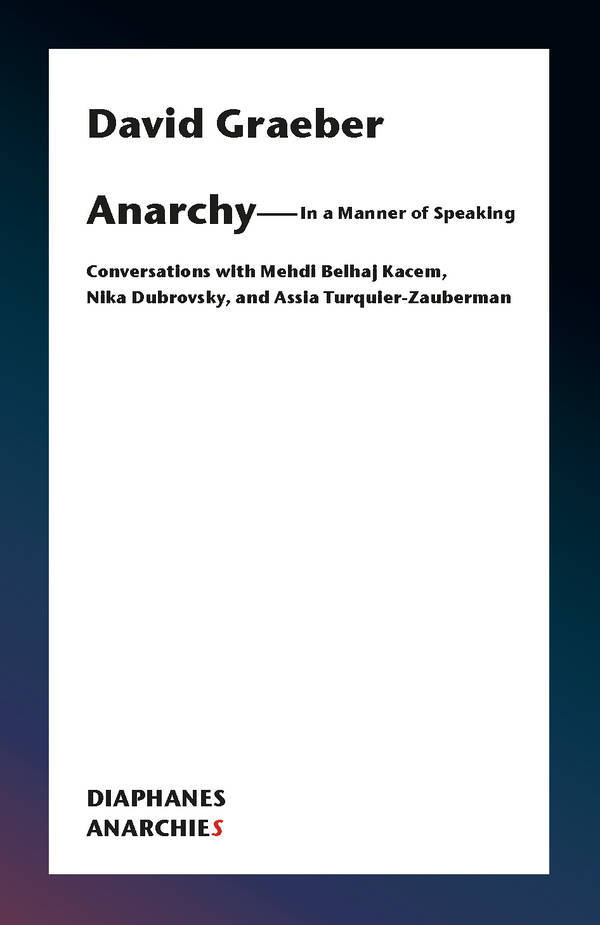Review/French
ALEXANDRE CHOLLIER
Dialogue, imagine…
Review/English
Alexandre Chollier
Over the years, David Graeber’s readers have developed an unusual habit of seeing their view of society change radically with each new publication. Whatever the subject, be it debt, bureaucracy or labour, there is no certainty that the anthropologist and anarchist does not succeed in debunking in his books, nor is there any discourse or practice that he does not revisit or irrigate.
In this sense, L’anarchie – pour ainsi dire, a book of interviews published this spring1, is an opportunity to look back at the importance of a work that is as singular and abundant as it is disconcerting, and for that reason absolutely essential.
Although it has just been published in French, this book already has a history. The English and German editions were in press when, on September 2, 2020, we learned, to our dismay, that David Graeber had died in Venice. There was no reason to believe that the work begun almost two decades ago could come to such an abrupt end. Appearing with some delay, the French edition is thus an opportunity to add an enlightening “Foreword” to this book. Enlightening but above all touching. First of all, because it is Graeber’s students who take up the pen and the emotion is palpable. Secondly, because they share their own experience with us and we get a better sense of what it means to have a dialogue with David: “He was unpredictable and spontaneous: when you wanted a conversation, you got a lecture; when you wanted a lecture, you got a conversation.” Finally, because they remind us that his absence makes them vulnerable, that the lack of conversation is unbearable for them. So they decide to make their then interlocutor a nowadays ancestor. There is no paradox in this, since what makes the cult of ancestors special is none other than the desire never to let them die. In other words, and to return to David Graeber, “to never let it become a noun, (…) to always use it as a verb”.
Diving into this book, one understands why. The author immediately addresses what he believes is the very heart of anarchism: the practice of dialogue. Forget everything you know about ideologies and remember that anarchism has a very bad -ism suffix. Here everything is organised around a “certain dialogical principle”, which he defines as follows: “Great attention is paid to making pragmatic and cooperative decisions with people who have fundamentally different worldviews, without trying to convert them to a particular point of view” (my italics). This is not to say that there is no “commonality of purpose”, quite the contrary.
This definition will certainly make some dogmatic anarchists cringe – there are some – but the important thing is elsewhere. By making dialogue his cornerstone, David Graeber reminds us that any construction worthy of the name – utopian or not – is less an object than a process, and that as such it can be the place from which thoughts emerge “that no individual could have had by himself”. Imagining a different future will involve this.
To dialogue, to imagine. The kinship between these two verbs is more intimate than one might think. The anarchist is answered here by the anthropologist. A strange anthropologist indeed, for whom “the real potential of anthropology has always been to force us to see in humans much more than we were encouraged to imagine”. David Graeber is all the more aware of the urgency of rethinking the past because he knows that a restricted, biased or even frozen imagination is more self-defeating than emancipating.
This is why he defended to the end the idea that we must never stop rereading and rewriting the past. Not to erase its rough edges or magnify its features, but in order to counteract the histories that have too often been written: “in such a way as to prevent us from imagining a viable future”.
The recent publication of the book In the Beginning was…2, co-authored with archaeologist David Wengrow, will undoubtedly prove this. I look forward to it.
Notes
| 1. | ↑ | David Graeber, L’anarchie – pour ainsi dire, conversations avec Mehdi Belhaj Kacem, Nika Dubrovsky et Assia Turquier-Zauberman, Diaphanes, mars 2021. |
| 2. | ↑ | David Graeber et David Wengrow, Au commencement était…: une nouvelle histoire de l’humanité, Editions LLL, nov. 2021 |

